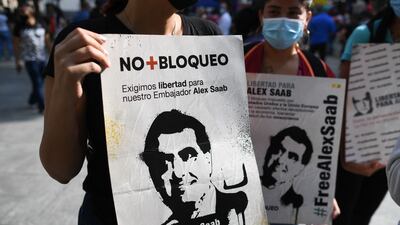The man accused of acting as a money launderer for Venezuelan President Nicolas Maduro's regime, on Sunday said he would not collaborate with the US.
A day after Alex Saab was extradited to the US from Cape Cape Verde, Mr Maduro said in a televised address on Sunday evening that the move was “one of the most ignoble and vulgar injustices committed in recent decades.”
A rally backed by authorities was held in Mr Saab's support earlier on Sunday in Caracas, during which his wife, Camilla Fabri, read aloud a letter from him.
“I will face my trial with total dignity,” Mr Saab said in the letter. “I want to be clear: I do not have to collaborate with the United States. I have committed no crime.
“I declare that I am in full possession of my means and I am not suicidal, in case I am murdered and then [they] say that I committed suicide.”
Mr Saab, a Colombian citizen, and his business partner Alvaro Pulido are charged in the US with running a network that exploited food aid destined for Venezuela, an oil-rich nation mired in an acute economic crisis.
They are accused of moving $350 million out of Venezuela into accounts they controlled in the US and other countries. The pair risk up to 20 years in prison.
The US Justice Department said Mr Saab was due to appear in court in Florida on Monday and expressed “admiration” to authorities in Cape Verde for their help in the case.
Venezuela reacted furiously, suspending talks with the US-backed opposition on ending the country's political and economic crisis.
Mr Saab, who also has Venezuelan nationality and a Venezuelan diplomatic passport, was indicted in July 2019 in Miami for money-laundering, and arrested during a plane stopover in Cape Verde off the coast of West Africa in June 2020.
Colombian President Ivan Duque on Saturday praised Mr Saab's extradition, calling it a “triumph in the fight against the drug trafficking, asset-laundering and corruption”, which he said have blossomed under Maduro's government.
In a development not officially linked to the Saab extradition, shortly after the news broke, six former oil executives under house arrest for corruption in Venezuela were taken to an undisclosed prison.
They had worked for Citgo, a US-based subsidiary of the state oil company PDVSA. Five of the six hold US citizenship and the other is a permanent resident of the US.
“American detainees in Venezuela are now being used as political pawns,” said US Democratic Party heavyweight Bill Richardson, who led an unsuccessful mission to Venezuela to seek the executives' release last year.
Mr Richardson has managed international negotiations for a number of high-profile American detainees.
“We will continue to press for their release,” he said.
The speaker of Congress, Jorge Rodriguez, said the government would not attend the fourth round of talks with the opposition due to start Sunday in Mexico City “as a deep expression of our protest against the brutal aggression” against Mr Saab.
Roberto Deniz, a journalist who has covered Mr Saab's story for the Venezuelan investigative news site Armando.info, said last month that the regime in Caracas was desperate to get him released.
“It is clear that there is a lot of fear, not only because he may reveal information about bribes, about the places where money was moved and the inflated pricing,” Mr Deniz said, but also because Saab “was the bridge for many of these deals that the Maduro regime is beginning to carry out with other allied countries.”

